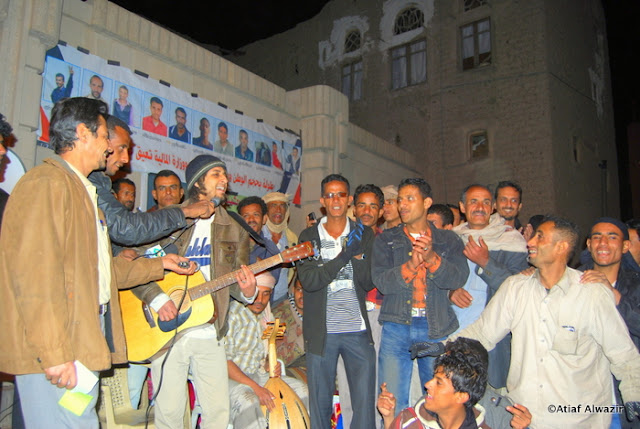One example is the lack of medical care given to the wounded protesters. Although a law was decreed to provide health care to all victims of the revolution, many have not received any treatment or compensation. Others were promised to travel abroad seeking medical treatment but that has not been implemented.
Hence, many wounded protesters and their supporters began a sit-in infront of the Cabinet at the end of January. Then on February 2nd more people joined after the death of Mohammed Al-Ariqi, (photo below), a protester who was injured on the 24 of May 2011 when he was run over by a military vehicle in front of Al-Shab School in Taiz.
After his death a group of injured revolutionaries camped in front of the Cabinet office, calling on the government to provide them with their rights for financial compensation or treatment abroad and at noon on February 5th, Muneef alzubairi a poet and supporter of the injured protesters set himself on fire protesting lack of care by the Yemeni government to wounded revolutionaries.
At noon today, Muneef alzubairi set himself on fire, protesting the lack of care to wounded revolutionaries by the Yemeni government. Photo by Hamdi Radman
Wounded protesters and their supporters camped outside the Cabinet Office since end of January 2013.
On February 5th, 2013 the “Black bloc” of Yemen joined the march to support the wounded protesters
On February 12, a day after the celebrations to commemorate the second anniversary of the revolution, Central Security forces surrounded the sit-in site and attacked peaceful protesters on hunger strike, with batons and tear gas causing the hospitalization of at least four protesters.
Member of Parliament Ahmed Saif Hashid in the intensive care unit in Al-Jumhori Hospital in Sanaa, while supporters and journalists flocked around him
Supporters of the wounded Mohammed Albalaghy and Musa Alrammas lie in Al-Jumhori Hospital after attack on February 12, 2013.
Khalid Ahmed Hussein holds a photo of his 7 year old daughter who was shot during a protest while looking out the window of her home.
Wounded Poet Hussein Abdulkarim, often entertains the sit-in with political satirical poetry . He was wounded twice in 2011, once by a bullet wound and suffocation from tear gas.
The IV tree gives life to the protesters on hunger strike.
Signs from left to right read: “Revolutionary Muhammed Salem Basindowah (prime minister): you revolted..you betrayed.. wounded from the revolution” “Mr. Prime Minister, the demand of the wounded revolutionaries is medical treatment, not besiegement” & “you exceed expectations with your besiegement just as you exceed expectations in your negligence of the nation”.
As their plight has not gained much media coverage, activists turn to social media to spread information.
In solidarity with the injured protesters, artists and poets, such as Ahmed Asery above joined the camp for a night of entertainment.












No comments:
Post a Comment